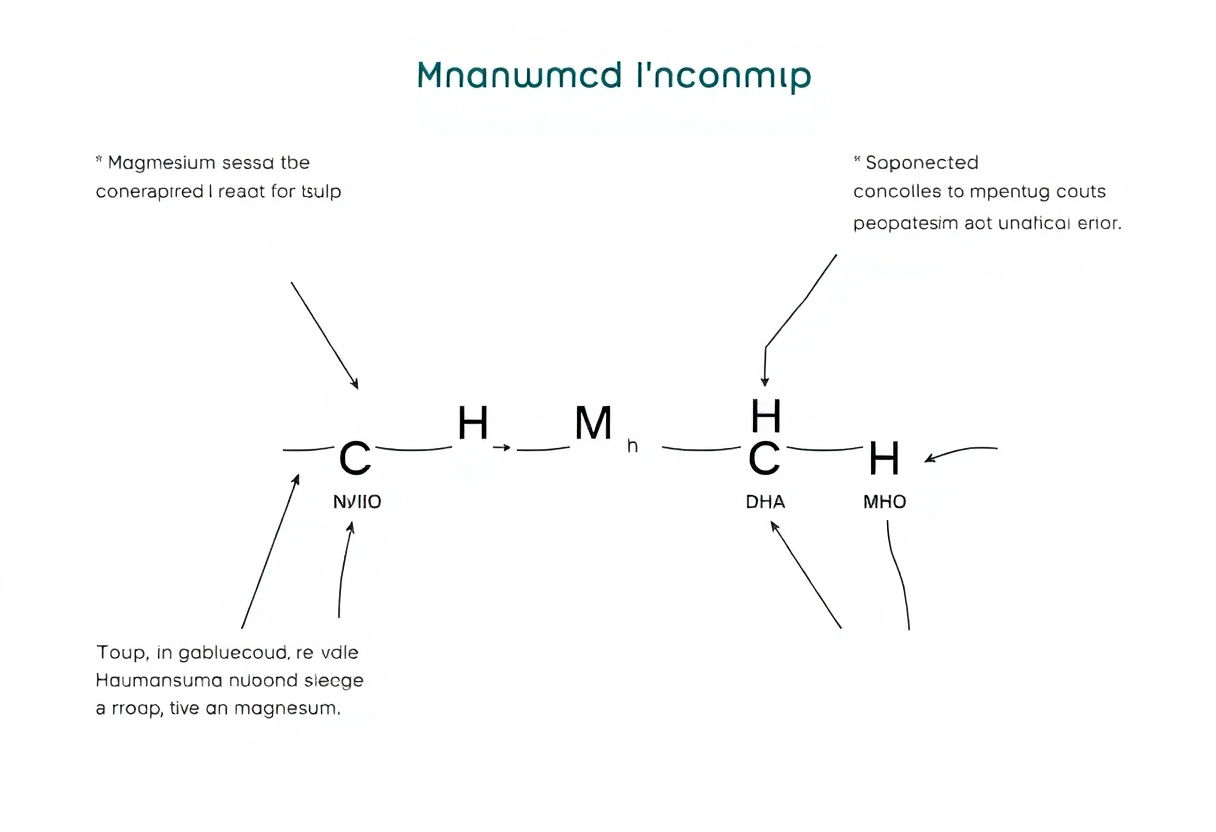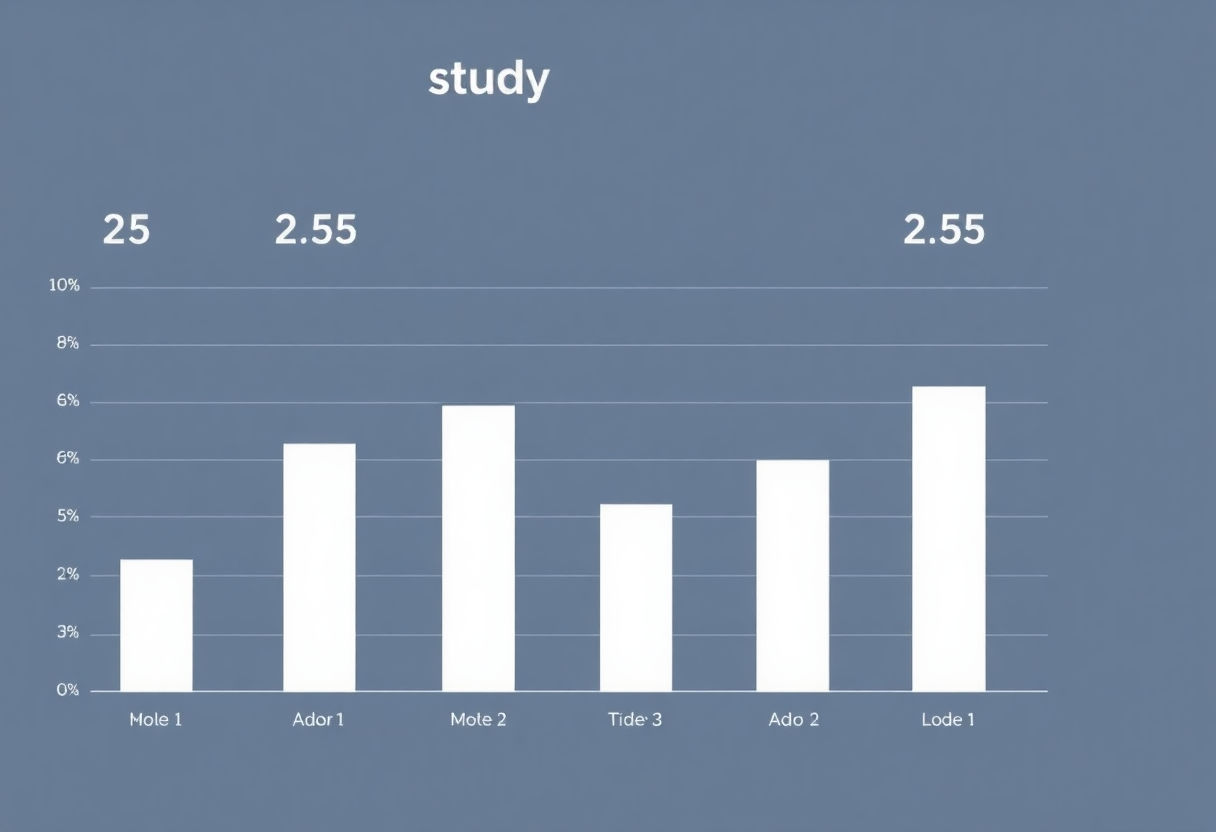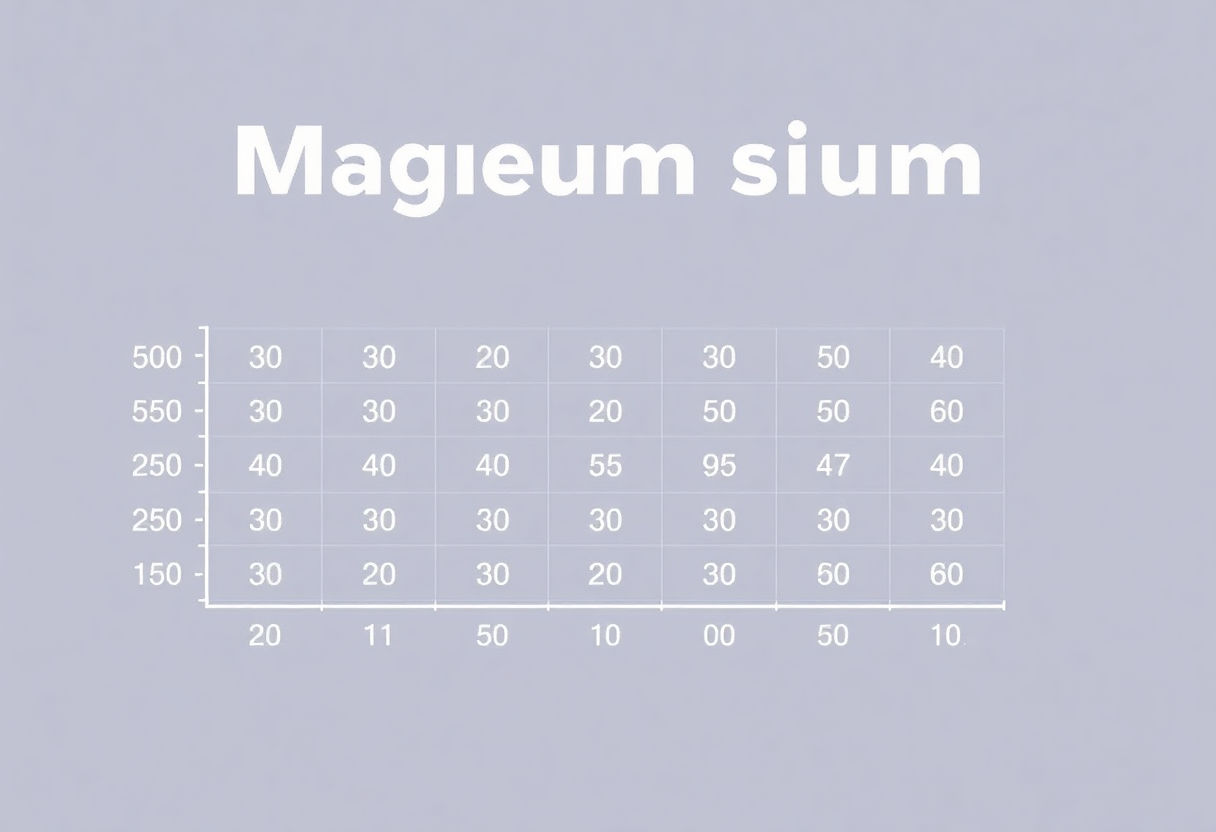Magnesium complex is increasingly recognized for its significant role in enhancing cognitive function and promoting overall brain health. This article delves into the multifaceted benefits of magnesium complex, enlightening readers on its biological mechanisms and scientific underpinnings. As we explore the role of magnesium in maintaining cognitive vigor and examine dosages for optimal safety, you’ll gain a comprehensive understanding of its potential to transform brain wellness. Whether exploring dietary sources or the efficacy of supplements, this analysis provides essential insights for those keen on harnessing the mental benefits of magnesium complex.
Key Takeaways
- Magnesium complex plays a crucial role in enhancing cognitive functions by impacting synaptic plasticity and neuronal signaling.
- Scientific evidence underscores magnesium’s potential in improving memory and reducing the risk of cognitive decline.
- Understanding the biological composition of magnesium complex helps elucidate its powerful effects on brain health.
- Proper dosing is essential to maximize benefits while ensuring safety, with recommended daily allowances varying by age and health status.
- Exploring natural dietary sources and understanding supplement forms can optimize magnesium intake for better cognitive performance.
Understanding Magnesium Complex
 Magnesium complex is a multifaceted compound that plays a pivotal role in numerous biological processes crucial to brain health. Comprising different magnesium compounds such as magnesium glycinate, magnesium citrate, and magnesium oxide, this complex enhances the bioavailability of magnesium, allowing for more efficient absorption in the body. The diversity in magnesium compounds in the complex enables it to support a range of cognitive functions.
Magnesium complex is a multifaceted compound that plays a pivotal role in numerous biological processes crucial to brain health. Comprising different magnesium compounds such as magnesium glycinate, magnesium citrate, and magnesium oxide, this complex enhances the bioavailability of magnesium, allowing for more efficient absorption in the body. The diversity in magnesium compounds in the complex enables it to support a range of cognitive functions.
Biologically, magnesium serves as a co-factor in over 300 enzymatic reactions, which include vital processes related to neurotransmitter synthesis and energy metabolism. As the human body does not naturally produce magnesium, it must be obtained from dietary sources, making supplementation a crucial consideration for many individuals.
The importance of the magnesium complex is underscored by its ability to maintain synaptic plasticity, which is essential for learning and memory. By facilitating the flow of ions across neuron membranes, magnesium enhances nerve transmission and muscle contraction. Furthermore, its role in moderating the NMDA (N-methyl-D-aspartate) receptor, a key player in synaptic plasticity, showcases its significance in cognitive performance.
According to a publication by the Office of Dietary Supplements, studies indicate that magnesium compounds can significantly reduce the risk of neurodegenerative diseases. This underscores the need to maintain adequate magnesium levels for cognitive health, reinforcing the magnesium complex’s role in enhancing brain function.
Incorporating a magnesium complex into one’s diet can, therefore, serve as a strategic approach to bolster cognitive vitality and resilience, especially in the face of advancing age.
Role of Magnesium in Brain Health
Magnesium plays an essential role in brain health, functioning as a key cofactor in over 300 enzymatic reactions that regulate biochemical processes critical to maintaining neurological function. Its influence extends to neurotransmitter systems, particularly those involved in synaptic transmission, plasticity, and memory formation. Studies indicate that adequate levels of magnesium are crucial for the proper functioning of the N-methyl-D-aspartate (NMDA) receptors, which mediate synaptic potentials and are pivotal for learning and memory.
The availability of magnesium in the brain influences the ability of neurons to adapt and change through new synaptic connections—a process known as synaptic plasticity. This adaptability is central to cognitive processes and is linked to enhanced learning and memory retention. Furthermore, magnesium contributes to the regulation of calcium ions in neurons, thereby preventing excessive neuronal excitation that could result in neurotoxicity and diseases such as Alzheimer’s.
Research suggests that magnesium supplementation may offer neuroprotective benefits, which are highlighted in studies exploring its relationship with reduced risks of cognitive decline. For example, magnesium’s potential to shield the brain from oxidative stress and inflammation has been explored in various therapeutic contexts, including efforts to leverage its inherent properties for magnesium neuroprotection benefits. This makes magnesium a promising agent not only for maintaining current cognitive function but also for proactive cognitive enhancement.
In summary, the role of magnesium in brain health is multi-faceted, affecting everything from basic cellular processes to complex networks driving cognition, ultimately underscoring its importance in sustaining and enhancing mental acuity.
Mechanisms of Cognitive Enhancement
 Magnesium complex is integral to several pathways that contribute to cognitive enhancement through its multifaceted role in brain chemistry. One of the primary mechanisms is its influence on synaptic plasticity, which is fundamental for learning and memory. Magnesium ions facilitate the activation of NMDA receptors, a crucial component in synaptic plasticity, thereby enhancing learning efficiency and memory retention.
Magnesium complex is integral to several pathways that contribute to cognitive enhancement through its multifaceted role in brain chemistry. One of the primary mechanisms is its influence on synaptic plasticity, which is fundamental for learning and memory. Magnesium ions facilitate the activation of NMDA receptors, a crucial component in synaptic plasticity, thereby enhancing learning efficiency and memory retention.
Moreover, magnesium modulates neurotransmitter activity, particularly affecting gamma-aminobutyric acid (GABA) and glutamate, two key neurotransmitters involved in maintaining a balanced excitatory-inhibitory function within the brain. This balance is essential for optimal cognitive processing.
Another significant mechanism is magnesium’s role in energy metabolism within brain cells. It acts as a cofactor for numerous enzymes, participating in ATP production, which is vital for maintaining high levels of mental energy and focus during cognitive tasks.
Further, magnesium contributes to neuroprotection by mitigating oxidative stress and reducing neuronal damage. It achieves this by scavenging free radicals and stabilizing cellular membranes, thus preserving cognitive function over time.
Additionally, magnesium’s impact on inflammation is noteworthy. Chronic inflammation has been linked to neurodegenerative conditions, and magnesium is known to suppress inflammatory pathways, thereby potentially reducing the risk of cognitive decline. Its ability to enhance synaptic connections can also be explored through concepts of cognitive synaptic plasticity, which is pivotal for cognitive adaptability.
Through these diversified biochemical interactions, the magnesium complex demonstrates a profound potential to support and enhance cognitive function, making it a promising candidate in the realm of nutritional neurobiology.
Scientific Evidence Supporting Magnesium Use
 Recent studies have provided substantial scientific evidence supporting the cognitive benefits of magnesium. Research indicates that magnesium contributes significantly to neural plasticity, a cornerstone of cognitive function. In particular, a groundbreaking study revealed that magnesium L-threonate, a novel form of magnesium, enhances learning abilities, working memory, and short- and long-term memory. This particular form is noted for its superior ability to penetrate the blood-brain barrier, thereby increasing brain magnesium levels more effectively than conventional forms of magnesium.
Recent studies have provided substantial scientific evidence supporting the cognitive benefits of magnesium. Research indicates that magnesium contributes significantly to neural plasticity, a cornerstone of cognitive function. In particular, a groundbreaking study revealed that magnesium L-threonate, a novel form of magnesium, enhances learning abilities, working memory, and short- and long-term memory. This particular form is noted for its superior ability to penetrate the blood-brain barrier, thereby increasing brain magnesium levels more effectively than conventional forms of magnesium.
Further consolidating these findings, a high-dose magnesium study demonstrates the mineral’s capacity to positively modulate neurotransmitter balance and enhance synaptic transmission. By influencing these fundamental neural processes, magnesium contributes to improved focus, clarity, and cognitive resilience. This study underscores the potential of magnesium in optimizing brain functions, which is especially crucial in age-related cognitive decline.
Moreover, magnesium’s role in mitigating oxidative stress and inflammation within the brain is well-documented. Chronic inflammation and oxidative damage are well-known contributors to neurodegenerative diseases. By reducing these harmful elements, magnesium provides a protective mechanism, facilitating healthier brain aging and supporting cognitive longevity.
In addition to these findings, clinical trials have reinforced magnesium’s potential in alleviating anxiety and depressive symptoms, conditions frequently hindering cognitive performance. Magnesium’s neuroprotective properties and its influence on the brain’s chemical pathways present a credible argument for its inclusion in cognitive health strategies. This multifaceted approach to brain health highlights the mineral’s essential contribution to maintaining optimal cognitive functions.
Recommended Dosage and Safety
 To ensure the optimal cognitive benefits of magnesium complex, adhering to the recommended dosage is crucial. For adults in the United States, the National Institutes of Health suggests a daily intake of 310 to 420 milligrams of magnesium, depending on age and sex. However, when using a magnesium complex supplement specifically aimed at cognitive enhancement, it is advisable to consult with a healthcare professional to tailor the dosage to individual needs and health conditions. This personalized approach can help maximize benefits while reducing the risk of adverse effects.
To ensure the optimal cognitive benefits of magnesium complex, adhering to the recommended dosage is crucial. For adults in the United States, the National Institutes of Health suggests a daily intake of 310 to 420 milligrams of magnesium, depending on age and sex. However, when using a magnesium complex supplement specifically aimed at cognitive enhancement, it is advisable to consult with a healthcare professional to tailor the dosage to individual needs and health conditions. This personalized approach can help maximize benefits while reducing the risk of adverse effects.
Safety considerations are paramount when integrating magnesium complex into a regimen. While magnesium is generally safe, excessive intake can lead to undesirable side effects, such as diarrhea, nausea, and abdominal cramping. In more severe cases, high dosages may result in magnesium toxicity, manifesting as irregular heartbeat, low blood pressure, or respiratory issues. Thus, individuals are urged to closely adhere to recommended dosages and seek medical advice if they experience any concerning symptoms.
Additionally, there are specific groups that should exercise caution. Individuals with existing kidney problems, heart conditions, or those taking certain medications—such as antibiotics or diuretics—should consult healthcare providers prior to beginning magnesium supplementation. This is vital as magnesium can interact with medications, potentially altering their effectiveness.
In summary, while magnesium complex can be a powerful tool for cognitive enhancement, careful consideration of dosage and safety is essential to harness its benefits effectively and safely.
Dietary Sources of Magnesium
 Magnesium is a vital mineral that plays a crucial role in supporting cognitive health, and obtaining it through diet can be highly beneficial. Many natural dietary sources of magnesium can be easily incorporated into one’s daily nutrition plan.
Magnesium is a vital mineral that plays a crucial role in supporting cognitive health, and obtaining it through diet can be highly beneficial. Many natural dietary sources of magnesium can be easily incorporated into one’s daily nutrition plan.
Leafy green vegetables, such as spinach and kale, are excellent sources. These greens not only provide magnesium but also contribute to overall well-being with their high nutrient content. Nuts and seeds, including almonds, cashews, and pumpkin seeds, are particularly high in magnesium, making them a great snack choice for those looking to enhance their cognitive functions.
Whole grains also contribute significantly to magnesium intake. Foods like brown rice, quinoa, and whole wheat bread are not only filling but help maintain essential mineral levels in the body. Similarly, legumes, including lentils, chickpeas, and black beans, offer a double benefit by providing both protein and magnesium.
Fish, particularly fatty varieties such as mackerel and salmon, are great additions to a magnesium-rich diet. These types also offer omega-3 fatty acids, which further support brain health.
Lastly, avocados and bananas are fruits rich in magnesium and can easily be included in meals or snacks for an added health boost. For a comprehensive guide on magnesium-rich foods, refer to sources such as Magnesium-rich foods.
Incorporating these foods not only supports cognitive functions but also aligns with a balanced diet. This natural approach ensures that the vital mineral is readily available for optimal brain performance.
Comparing Magnesium Supplements
When considering magnesium supplements for cognitive enhancement, understanding the differences between various forms is crucial. Magnesium is available in several types, each differing in absorption rate, bioavailability, and effect on brain health.
Magnesium Citrate is a popular choice due to its high bioavailability and relative cost-effectiveness. It is well-absorbed and can address magnesium deficiencies effectively, potentially leading to improved cognitive function. This supplement is often suitable for individuals seeking a balance between effectiveness and affordability.
Magnesium Glycinate is another highly recommended form, known for its calming properties. It combines magnesium with glycine, an amino acid that supports nerve and brain function, making it particularly beneficial for reducing anxiety and enhancing sleep quality, both of which are crucial for optimal cognitive performance.
For those targeting more direct neurological benefits, Magnesium L-Threonate stands out. This form has been shown to cross the blood-brain barrier more efficiently, allowing for higher concentrations of magnesium in the brain. Some studies suggest it can help improve memory and learning, making it a preferred option for individuals focusing on cognitive health.
Magnesium Oxide is more commonly used for addressing digestive issues rather than cognitive benefits due to its lower absorption rate. While it may not be the best choice for brain enhancements, it can still contribute to overall daily magnesium intake.
When selecting a magnesium supplement, it’s vital to consider individual health needs, potential deficiencies, and consult with a healthcare provider to determine the most appropriate form for optimizing cognitive health.
Potential Side Effects and Interaction Warnings
When considering magnesium complex for cognitive enhancement, it’s crucial to acknowledge potential adverse effects and interaction risks. While magnesium is generally well-tolerated, some individuals may experience mild side effects such as gastrointestinal discomfort, including diarrhea, nausea, or abdominal cramping. These effects are often dose-dependent and can vary based on the individual’s sensitivity and the specific form of magnesium used.
Additionally, interactions with certain medications can alter magnesium’s efficacy and safety. For instance, magnesium can affect the absorption of antibiotics, especially tetracyclines and quinolones, by binding to them and reducing their effectiveness. Furthermore, medications such as bisphosphonates, commonly prescribed for osteoporosis, may also interact with magnesium by diminishing their absorption.
It is important for individuals taking blood pressure medications or diuretics to be aware of magnesium’s potential to enhance the effects of these drugs, possibly leading to low blood pressure or imbalances in electrolyte levels. Anticoagulants are another category of medication that could be affected by magnesium, calling for careful monitoring.
For a comprehensive understanding of these interactions, refer to insightful resources like the detailed magnesium interactions review, which provides an exhaustive exploration of how magnesium interacts with various medications.
Given these considerations, it is highly advisable to consult healthcare providers before incorporating magnesium complex into a supplement regimen, especially for individuals on medication or those with pre-existing health conditions. A medical professional can provide personalized advice tailored to the individual’s health profile, ensuring that magnesium complex is used safely and effectively for cognitive enhancement.
Conclusion
In conclusion, the use of magnesium complex for cognitive enhancement shows promising potential, supported by numerous scientific studies. It plays a crucial role in maintaining brain health, providing benefits such as improved memory and mental clarity. Given its effectiveness and safety, following recommended dosages is advised for optimal results. As research progresses, the future may unveil even more about its applications in cognitive health. Embrace dietary magnesium sources and supplements thoughtfully, ensuring they are part of a balanced approach to enhancing cognitive functions.
Frequently Asked Questions
How does magnesium complex enhance cognitive function?
Magnesium complex enhances cognitive function by supporting neurotransmitter activity and synaptic plasticity, which are crucial for memory and learning processes.
What is the recommended daily dosage of magnesium complex for cognitive benefits?
The recommended daily dosage varies based on age, sex, and specific health needs, but generally ranges from 310 to 420 mg for adults. It is advisable to consult with a healthcare professional for personalized guidance.
Can magnesium complex supplements have side effects?
While magnesium complex is generally safe, excessive intake can lead to digestive issues such as diarrhea or stomach cramps. Always adhere to recommended dosages and consult a healthcare provider if uncertain.
Are there particular foods high in magnesium that can support cognitive health?
Yes, foods such as spinach, almonds, avocados, and dark chocolate are rich in magnesium and can support cognitive health when included in a balanced diet.
Is it safe to take magnesium complex with other medications?
Magnesium can interact with certain medications, such as antibiotics and diuretics. It is essential to discuss any supplement use with a healthcare professional, especially if combining with other medications.
